A candidate in the recently concluded Joint Admissions and Matriculation Board (JAMB) examinations in Nigeria with a twitter handle @ArorRuke tweeted about her frustration with the Obafemi Awolowo University’s undergraduate recruitment system. In some of her tweets which can be seen in the screenshot below, she wrote:
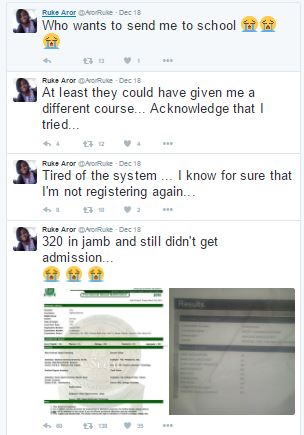
Her tweets generated discussions on Nairaland Forum: Girl laments over inability to secure admission after scoring 320 in JAMB, with different comments, some of which can be seen in the screenshot below:
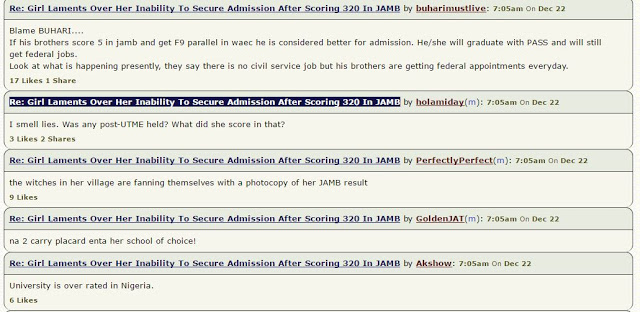
These comments prompted reaction from the Provost of the College of Health Sciences of the university to write a rejoinder on the issue; explaining the admission process and giving reasons to why Ms Aror Ruke did not make the university’s cut-off mark: Provost of Health Sciences OAU gives reasons why Mrs Aror wasn’t admitted.
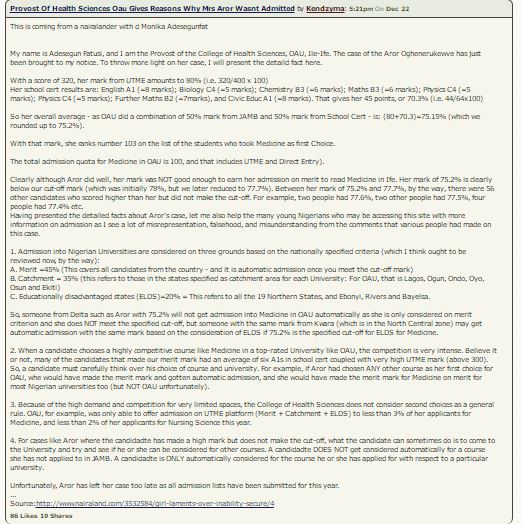
The provost in the response raised a fundamental issue (emphasised below by me) before listing the admission criteria in Nigeria, that:
Admission into Nigerian Universities are considered on three grounds based on the nationally specified criteria (which I think ought to be reviewed now, by the way):
A. Merit =45% (This covers all candidates from the country – and it is automatic admission once you meet the cut-off mark)
B. Catchment = 35% (this refers to those in the states specified as catchment area for each University: For OAU, that is Lagos, Ogun, Ondo, Oyo, Osun and Ekiti)
C. Educationally disadvantaged states (ELDS)=20% = This refers to all the 19 Northern States, and Ebonyi, Rivers and Bayelsa.
Firstly, going by the first criterion, only 45% of the candidates are admitted based on merit and this shouldn’t be the case – if as a nation, the country wants to be progressive, inclusive and creates a socially engaged citizenry – especially the youths.
Secondly, basing only 45% of the admission slots on merit would not encourage students to work their socks off in order to pass and hopefully gain admission into a university, rather, it would potentially make some of the students, if not most of the students, to take to examination malpractices in order to gain undue advantage over their fellow applicants (for quite a while now the issue of examination malpractices has been a major problem in the Nigerian education system).
The fact that young people who are innocent of the political manipulations in the system are being made to pay the price for an inefficient and outdated policy, does not augur well for the future of the country. It means for every four (4) competent candidates that were admitted into tertiary education in Nigeria at least five (5) have been denied admission even though they would have been able to make it on merit.
The implication of such a policy on the long term is that it means in the nearest future the country will produce more un-merited graduates than merited ones; whilst those that should have been trained and that duly merited it, would have been deprived the opportunities to fulfil their dreams, achieve their career aspirations and contribute immensely towards the development of the country.
The negative multiplier effect of such a policy becomes more significant and gives a not too rosy picture of the future of professionalism in any field of endeavour in the country – since the same policy applies to the general admission process of all the federal universities in the country. And the real danger is that a significant number of the best brains in the country would be wasted whilst lesser competent hands would be given the right to champion the course of the development of the country.
On the second criterion, the provost stated that 35% of the admission in-take is based on catchment area for each university and from the list of states the provost listed: Lagos, Oyo, Ogun, Ondo, Ekiti and Osun, it is obvious that all these states are from the southwest region of the country and if this is the general trend in the country, then, how would such a system promote diversity and integration of Nigerians from different parts of the country? It seems a golden opportunity is being missed by the government in promoting unity in the country through tertiary education; the opportunity for young Nigerians to mix and experience different cultures and make lifetime friendships with people who did not grow up in similar cultural settings to them is being limited by such a policy.
Also, the catchment area policy is based on state of indigeneship and not state of residence. For instance, it means that an applicant who was born and brought up in Oyo state by parents whose state of indigeneship is Kwara state cannot claim Oyo state and as such has lost the right to be considered under the 35% catchment area policy in the admission process, even though in the true sense of things this candidate has his/her education in Oyo state. This approach would only reinforce a sense of nepotism in the country, a lack of sense of identity and belonging of residents with their place of local residence. Hence, it would promote a sense of indigeneship that in reality they do not truly understand or connect with and most unfortunately indigeneship is a narrowly defined term in Nigeria’s context.
On the third criterion, the provost states that some states in the country are known as Educationally Disadvantaged States (ELDS) – the politics of ELDS is not something that I want to cover in this write-up. Rather, it is the fundamental issue with this criterion – that is, it seems that the parameters that are used to determine a state as ELD do not evolve and also that there is no evidence to show if some states have been able to move out of ELDS status or if some states have fallen into the ELDS category over time and this situation can only exist as a result of a fundamentally flawed system – if after years of establishing the ELDS criterion, the status quo has not changed.
Also, it is a fact that the youngest states in Nigeria were created in 1996 and that all the states in the country excluding the Federal Capital Territory – Abuja (only has a federal university) – have their own states’ universities and usually the admission policies of these states’ universities give priority to the indigenes of the states. Hence, if presently, all states have their own universities in Nigeria, then, why should 20% of the admission slot made available to ELDS? Perhaps, it would be better for the Federal Government of Nigeria to come up with a more transparent process of determining ELD states – if there is the need for it in the country? Also, there is need to redefine candidate’s eligibility based on state of residence rather than state of indigeneship. Hence, someone who had stayed in a particular state in the country for a certain number of years prior to applying to a tertiary institution in the country should be considered under such a law.
Another fundamental aspect of the ELDS issue is that – it’s more important to look into the aspect of a candidate’s socio-economic background and not the state of indigeneship status of a candidate.
For instance, a candidate (Ayo – not a real candidate) might come from an affluent family, lives in a non-ELD state but with an ELD state status due to the Ayo’s state of indigeneship status. However, as a result of the socio-economic status of Ayo’s family, Ayo had access to some of the best pre-tertiary education in the country, gets extra support at home or from home, have access to some of the best learning materials available and gets some of the best career guidance and counselling. Whilst another candidate (Tunde – not a real candidate) is from a non-ELD state due to Tunde’s state of indigeneship status but from a disadvantaged socio-economic background and lives in a very disadvantaged community with a family background of parent/s with low level or no formal education; attended some of the worst pre-tertiary education settings in the country with little or no access to: study materials, school meals, adequate support at home, specialist subject teachers at school, career guidance and counselling and at times poor medical facilities. And despite all these factors that are working against Tunde, Tunde will still be at disadvantage during the admission process as a result of the ELDS criterion. Hence, the question is – how does the ELDS criterion address such a fundamental social issue?
Finally, the three criteria listed by the provost should be reviewed as they seem to have outlived the main reasons that necessitated them in the first instance, however, this is not within the jurisdiction of the provost. Rather, the Federal Government of Nigeria – represented by the Federal Ministry of Education – in conjunction with the States’ Ministries of Education, the Senate and House of Representatives need to work together on the tertiary education admission criteria policy in the country and come out with an updated and more socially fair and just national policy.
If you like this post, kindly share it with your contacts.
For regular updates on similar topical issues, kindly subscribe to our monthly newsletter or follow us on Twitter @EdusoundsNg or on facebook.com/edusoundsng. Thanks!

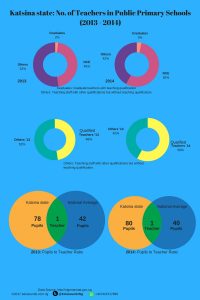
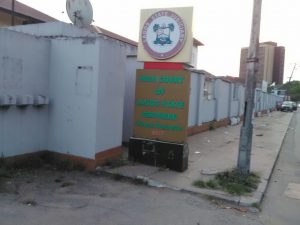

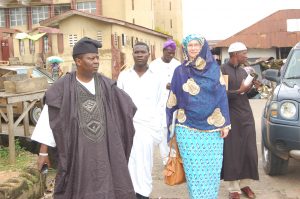
This is true, the policy has outlived its noble intentions. The next step is how to muster the political capital to push the reforms. The question is how high this issue is ranked on the government's list of priority.
Very insightful post. It's high time these issues surrounding admission into universities in Nigeria were looked into.
What about the fourth criteria, which is staff biological (children of universities staff)?
I agree with you that EDLS has outlived its usefulness. There is no zone that does not have federal university in addition to their various state universities. These federal universities also have these supposedly educationally disadvantaged states as their catchment areas. I also agree to having a percentage for residence quota. Hence, I would recommend dividing EDLS quota between indigeneship and residence. I would not agree however to totally scrapping the policy outrightly
My position isn't that it should be scrapped for scrapping sake, rather, the policy as a whole needs updating. Thanks for your comment and visiting my site.
That's a tough one! I'll leave that for people in the know to tackle 🙂 Cheers and thanks for the comment and visiting my site.
Let's hope there'll be enough political will on the part of people in government to do so. Thanks for the comment and visiting my site.
Hopefully, things will get better in the nearest future. Thanks for your comment and visiting my site.
Nice post.
If there would be any consideration for admission aside merit, it should be the socioeconomic status of the family.
The worst part of this fraud is the right of staff''s biological children to enter for any course with mediocre scores.